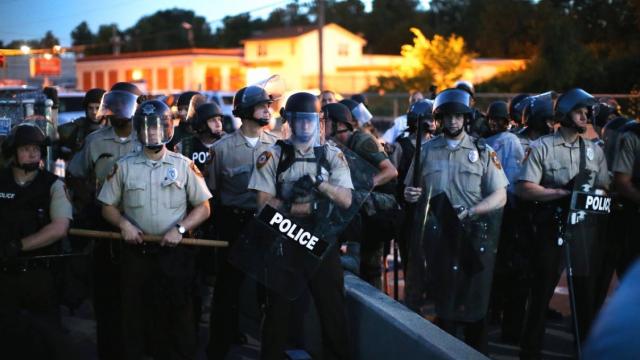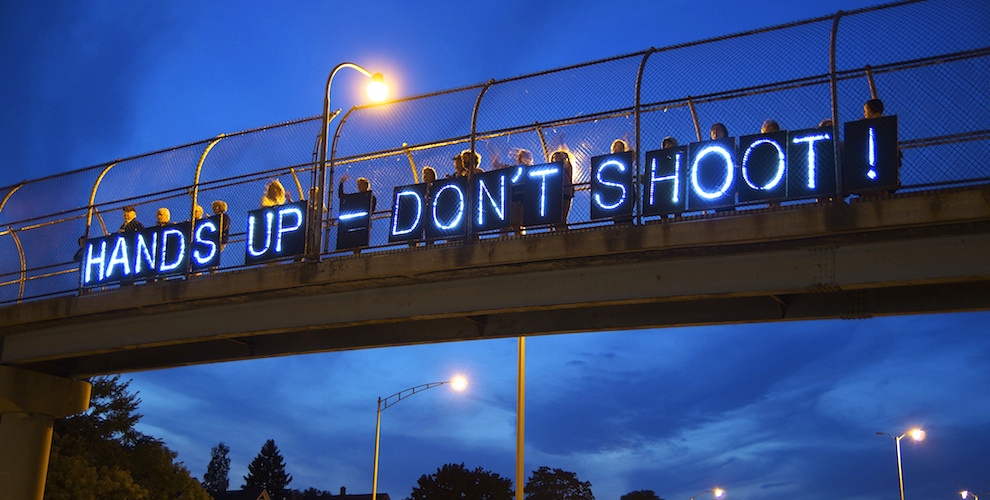
Demonstrating in Ferguson late in the summer, activist and former Green Party vice presidential nominee Rosa Clemente posted to Facebook:
"We ran to get away and were surrounded on a small path on [a] bridge, surrounded by all types of police and told to lie down and put our hands up. We complied and we were told if we did not stop moving we would be shot. We were breathing. The young brother lying on my feet as I was holding him was not able to control his breathing he said 'I’m choking' the cop told him to stop or he would shoot him. I told him 'try not to move, just lay still I got you.'"
"The gun was at his chest. I looked at the cop and said 'please, he is not doing anything' I tried to record but the cop had his finger on the trigger . . . We laid there until one Black officer said 'Let them go, we got who we wanted.' In all my life I have never been so terrified . . . What is going down here in Ferguson in all my years of activism, organizing, I have never seen."
A few months later, Ferguson exploded again as a highly problematic Missouri grand jury failed to indict Darren Wilson, the cop who killed Michael Brown. A week later, a New York grand jury failed to indict NYPD Officer Daniel Pantaleo for killing Eric Garner—on video, with Garner pleading for his life, not behaving violently, the victim of an illegal police procedure.
Dayvon Love, director of the Baltimore-based Leaders of a Beautiful Struggle, wrote in response: “The goal is not to make white people care about our pain, the goal is to be so effectively organized that it does not matter if they care.”
One way to make the apathy of privileged whites irrelevant is to build institutions that guarantee material economic justice. We can’t make everyone care, but we can hard-wire security and equality into our communities and institutions, and it is through such material remaking of our lives that new public safety practices and a new policing can emerge.
Law and Order is a Sham
The people of Ferguson and the greater St. Louis area have been subjected to indescribable degradation by the police and the reactionary social forces that support the police. From leaving Michael Brown’s dead body in the street for four hours to the brutal repression of demonstrations; cops wearing “I am Darren Wilson” bracelets as a method of intimidation; the St. Louis police academy’s tone-deaf continuing education course offering a “highly entertaining” look at police shootings and how to handle them on the public relations end, and the highly irregular grand jury proceedings of which so much has already been written, Missouri has become a supercharged symbol of the current state of policing in America.
Our social codes of behavior, our ability to encourage and enforce norms of safety and restraint, have become militarized and brutalized, with violence the authorities’ first response instead of their last resort. “One sign of a police state is the use of police and prosecutors to solve everyday problems that a sane society would resolve in other ways,” D.C. Statehood Green Party candidate for Mayor Eugene Puryear recently said. “When jaywalking provokes a violent police response, when SWAT teams are deployed against people suspected of possessing small amounts of marijuana, then ‘law and order’ becomes a sham.”
Police intimidation has become an end in itself, an independent Leviathan. In Los Angeles, at a demonstration for Enzell Ford, a victim of the LAPD, hundreds of cops showed up outnumbering the demonstrators. In Chicago, brutality exists at the highest levels of police leadership. Across the country, episodes grow of police arresting and traumatizing women of color. Sexual assault by police officers occurs across several jurisdictions; it’s the second-most frequent complaint against cops, after excessive force.
Apologists make ill-supported appeals to public safety in an effort to defend very nearly everything any police officer does at any time. They argue that officers must have the option to use deadly force even when their target is not using deadly force, or is unarmed. They argue that policing is dangerous, without providing context for that contention. They argue that the police must crack down on collective violence, even though research has shown that police tend to provoke violence rather than merely respond to it.
Throughout all the apologetics, violence is seen as an inevitable facet, an essential role, of the police officer. Whether noble or regrettable, cops have to shoot people; they just do. “[W]e tend to talk about officer shootings as some inevitable fact of life, like the sunlight or the wind,” Jamalle Bouie, a writer on race relations at Slate, said recently.
The diagnoses are shallow and the remedies are weak. Even the most racially progressive and proactive legal organization in the country, the National Bar Association, limits its public argument to condemning the individual acts and complicity of police officers and departments. Legal remedies in the short-term are unlikely, since law enforcement agencies narrowly interpret the 1989 Supreme Court ruling in Graham v. Connor to allow officers to remove the reasonableness of their momentary decisions on use of force from larger questions about whether police have themselves provoked the conditions that led to that force.
Retraining, internal review, and even dialogues with the communities the police serve all seem useless when, as citizen police auditor LaDoris Hazzard Cordell recently pointed out, “officers view people of color as ‘f—king animals” and “see the people they are charged to protect and serve as subhuman and dangerous.”
While we should not reject any individual solution outright, none address the systemic context of police violence. Body cameras while desirable, are not a panacea because even they don’t address subjective interpretations of events. (The murder of Eric Garner occurred on camera.) More comprehensive reforms, such as an end to police militarization, are blocked by police lobbyists before they even have a chance to be considered by lawmakers. Cop unions, support organizations, and law-and-order pundits work around the clock to stifle even the mildest criticism of police practices or the weakest calls for reform.
The fear generated by our unstable and alienated economy makes the more privileged among us susceptible to the belief that anything less than unconditional support of all police tactics spells danger to public safety. Help from the White House is not promising either. On Dec. 1, President Obama appointed Philadelphia Police Chief Charles Ramsey as one of two co-chairs to head a commission on police demilitarization. But according to Mara Verheyden-Hilliard of the Partnership for Civil Justice Fund, Ramsey was responsible for several “bloody and abusive crackdowns on protesters” when he was Chief of Police in Washington D.C. The police cannot police the police.
Stay tuned for Part II of this article, appearing tomorrow.
3 WAYS TO SHOW YOUR SUPPORT
- Log in to post comments













